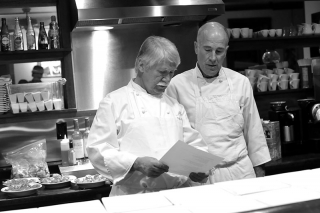
Education Works Best When Teachers Act as Facilitators, Not Sole Providers
07 February 2020The job of educating culinary students requires a network of influencers that goes far beyond the classroom instructor.
By Paul Sorgule, MS, AAC
College is common ground where some people find the necessary tools, information, skills and guidance to lead a productive and inspiring life. To this end, what happens within the walls of higher education should rely on a multitude of influencers who can work with students as they seek to fulfill their dreams.
Faculty members, of course, play an instrumental role in bringing about this outcome, but they cannot be expected to be the sole source of these career and life tools. If educators feel they have the responsibility to deliver life skills, knowledge, and guidance then they miss important opportunities that exist outside the college environment. Life and career education work best when teachers act as facilitators, rather than sole providers.
The breadth of knowledge required to nurture a culinary graduate who is both kitchen and career ready is enormous. Each graduate’s success throughout his or her career will greatly benefit from a well-established “network of influence” or a Rolodex of mentors and resources that support every individual’s career growth well beyond receipt of a diploma.
As a facilitator, a faculty member has access to numerous stakeholders who can and should have a vested interest in the successful preparation of tomorrow’s culinary leaders. Chefs, restaurateurs, hoteliers, community leadership, equipment manufacturers and wholesalers, ingredient vendors, trade organizations, growers and processors, and the media can all share in the value derived from culinary student success.
An effective culinary arts program is one that aligns this network of influence with students and finds ways for them to participate in a lifelong support system. This can include guest speakers, guest chef demonstrations, advisement, information support, supplemental content, program funding, provision of equipment, case studies for use in classes, internships or externships, permanent placement, serving as career advisors, and even providing future opportunities for entrepreneurship. Bringing these educational partners into the fold may be one of the most important steps a culinary program leader or faculty member can take.
As a facilitator rather than just a provider of information and training, a program leader can create a world-class curriculum regardless of the program’s size, breadth of facilities, or number of engaged instructors. Building a program strategy from this point of view will change everything. It will certainly change how a program leader or faculty member dedicates his or her time.
In the end, a program that takes advantage of this network can be focused on the current state of the industry, the delivery of a dynamic curriculum that adds diversity of thought and approach, a program that is truly connected to the region, and a program that stands out as one truly invested in a student’s short- and long-term success.
The program’s leadership might find a much broader job description as a result. The position description might look like this: The culinary program leader is an individual with the ability to develop an effective educational network by engaging community leaders to work with faculty members as they create a learning environment designed to develop kitchen and career-ready graduates. Network contacts may include professional chefs and restaurateurs, growers and food producers, trade organizations, equipment manufacturers, and career specialists. His or her ability to integrate all resources with an appropriate and current curriculum is paramount.
The faculty member might also find a more dynamic job description as a result. It might look like this: Culinary faculty members are professionals who have demonstrated the highest level of competence in their respective field and who have the capacity to develop and work with the defined network of influence that is the core of the program. Faculty members are expected to maintain strong, professional relationships with this network and seek effective ways of integrating these resources into the course delivery.
At a time when culinary programs are challenged to differentiate themselves, challenged to hire and maintain a team of culinary professions with the capacity to teach, and challenged to meet the needs of the industry they serve – it is this type of creative thought and effort that will allow a program to thrive and their students to succeed.
PLAN BETTER – TRAIN HARDER
Paul Sorgule, MS, AAC, president of Harvest America Ventures, a mobile restaurant incubator based in Saranac Lake, N.Y., is the former vice president of New England Culinary Institute and a former dean at Paul Smith’s College. Contact him at This email address is being protected from spambots. You need JavaScript enabled to view it..
